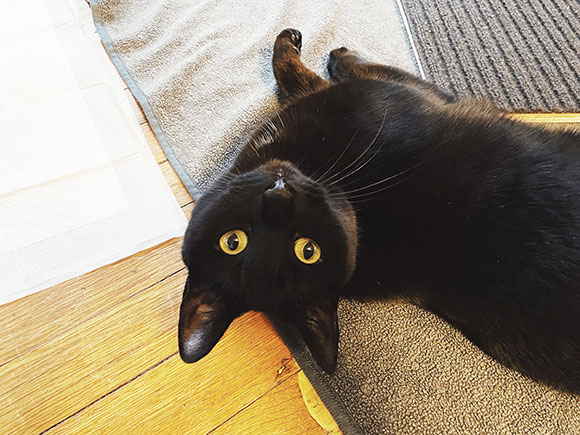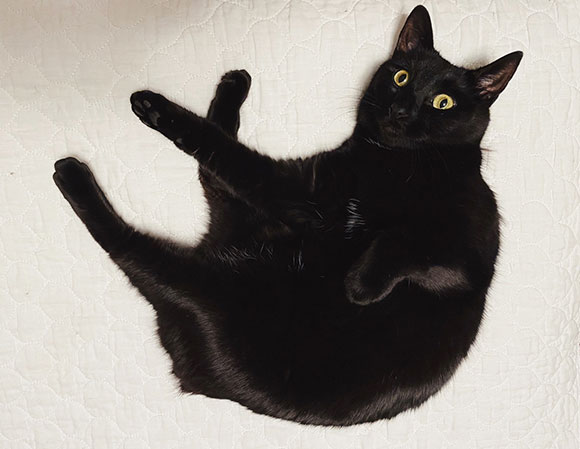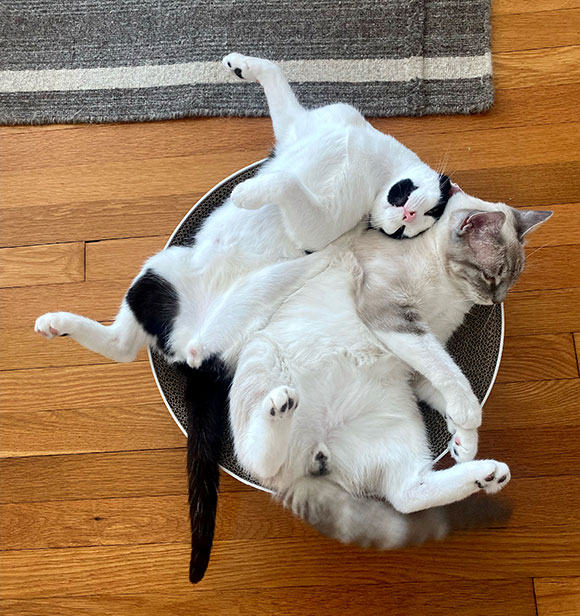
Midnight is a 4-year-old female black cat that Black Cat Rescue has been fostering after a dog bite. She is looking forward to being adopted soon! ~ Photos courtesy of Jennifer Stott
By Harry Kane
A new law signed by Massachusetts Gov. Maura Healey makes it illegal to declaw felines. That’s good news for cats and for foster operations like Black Cat Rescue, which is a Somerville based all-volunteer network dedicated to saving the lives of homeless black cats and cats with special needs.
The cat act (S.2552) prohibits inhumane feline declawing except in rare situations of medical necessity. The act was signed into law January 9 and takes effect on April 8.
“From a rescue perspective, the biggest thing we see, if we are getting declawed cats surrendered to us, is it’s nearly always for a behavioral issue,” said Jennifer Stott, co-founder of Black Cat Rescue.
Black Cat Rescue is a nonprofit organization that began in 2007 to provide black cats and cats with medical and behavioral issues a healing, therapeutic foster home to facilitate the adoption process.
Stott founded the organization along with co-founder Samantha McDuffee, and their operation has grown from 60 cats per year to 100 cats. While their no-kill cat rescue organization is smaller than most, they specialize in what she refers to as “undercats,” which are cats that have a harder time getting adopted.
Black cats and cats with special needs have a difficult time getting adopted, explained Stott. The foster home-based cat rescue organization has about 20 active foster homes at any given time, which are within a 30-minute radius of Somerville.
The medical, safety and behavioral risks associated with cat declawing had animal advocates calling the practice inhumane, which has led to the ban on declawing in Massachusetts.

While under the care of Black Cat Rescue, Midnight has received acupuncture and cold laser therapy following a tail amputation.
Cat declawing is an amputation procedure that removes the last bone of each toe including the nail bed and claw, akin to removing a human finger at the first knuckle.
In addition to a painful recovery, Stott says cats that have undergone the amputation procedure will exhibit “emotional dysregulation” resulting in aversion to litter boxes and a tendency to bite. Numerous studies point to a correlation between declawing and personality changes.
Stott says her organization doesn’t receive many cats that have been declawed and that in the recent past most veterinarians have refused to do the procedure unless it is medically necessary.
The all-volunteer network fosters homeless cats, whether they be feral or stray cats, owner surrenders, cats from local shelters or cats from other rescue organizations.
“Some cats go up for adoption more quickly than others…some need more intervention,” Stott explains. “These are people that want to volunteer their time and their homes to taking care of homeless cats. It’s wonderful for the cats because they get a home life and are treated just like a pet cat while they are waiting to be adopted.”
Stott works with these foster caregivers to assist in the cat’s recovery and stays in constant communication to determine the correct form of care needed. In certain cases, a licensed behaviorist attends to the cat.
All the cats require some kind of veterinarian care – from vaccinations to chemotherapy to surgeries – and Stott says they’ve had many medical success stories. “We give our cats every medical chance that they can have,” Stott said.
For example, a 4-year-old special needs female cat named Midnight is in a foster home and is awaiting adoption. Midnight came to Black Cat Rescue with a severe spinal injury after a dog attack that left her incontinent and with a dead tail. Midnight’s tail had to be amputated, and she has received acupuncture and cold laser therapy to assist in her recovery. Her incontinence has become more manageable and she has shown “remarkable resilience and strength.”
Black Cat Rescue stays operational thanks to generous donations that come from animal lovers in Somerville and Greater Boston. On their website, a support page provides information about various ways to help fund their organization. Visitors can also find cats available for adoption.
Their website has more information: www.BlackCatRescue.com

Peekaboo is the black and white cat that the rescue organization helped with a leg amputation. He is doing much better thanks to the surgery. He is in this picture cuddling with his new brother Lino.















Reader Comments